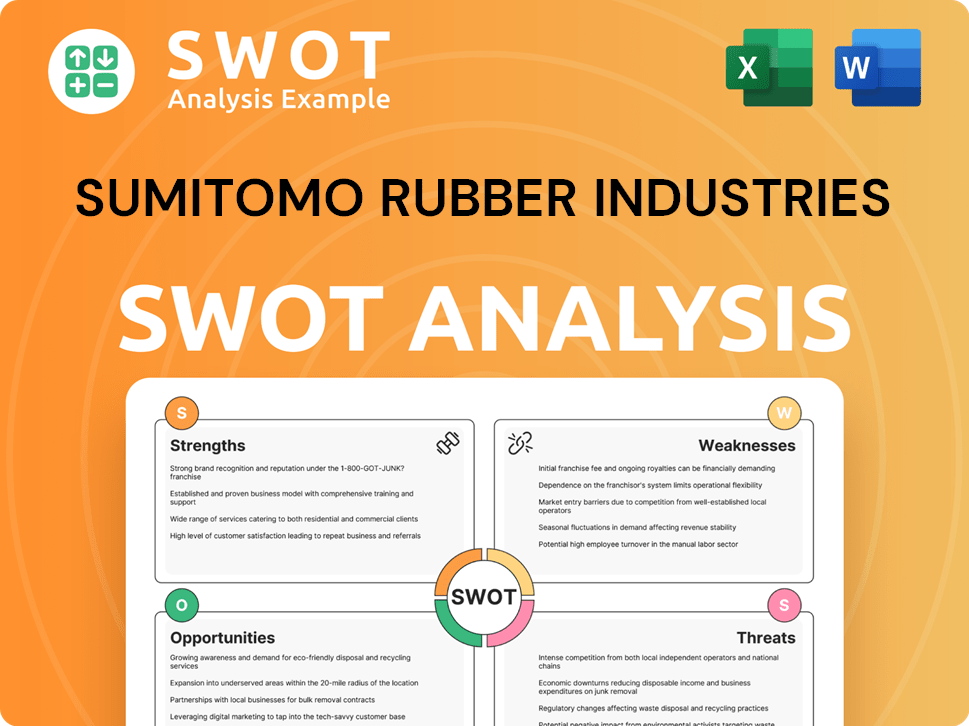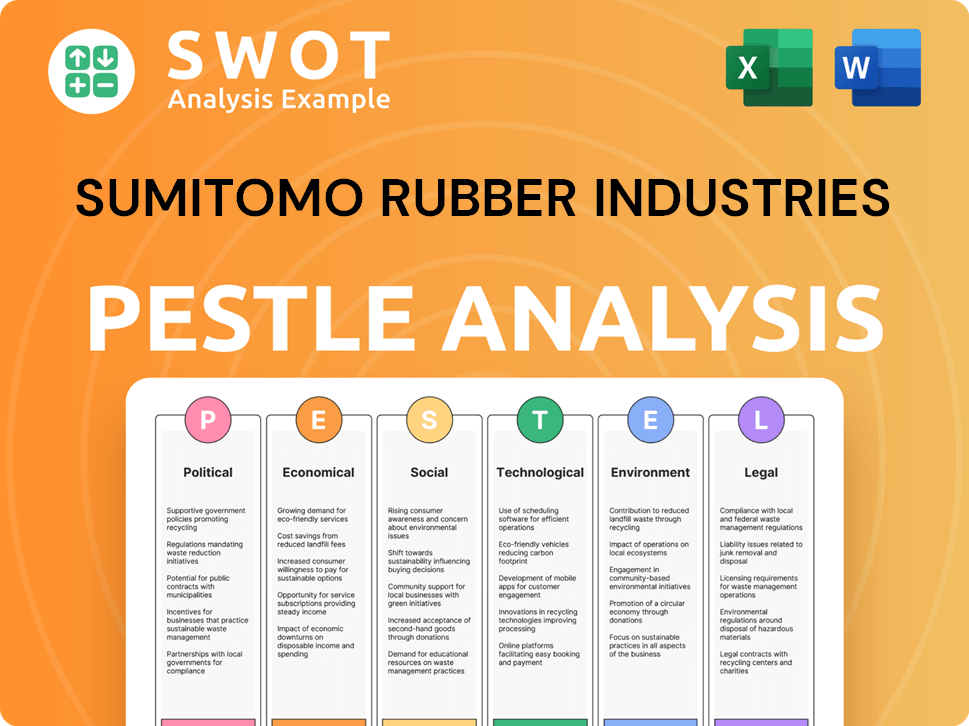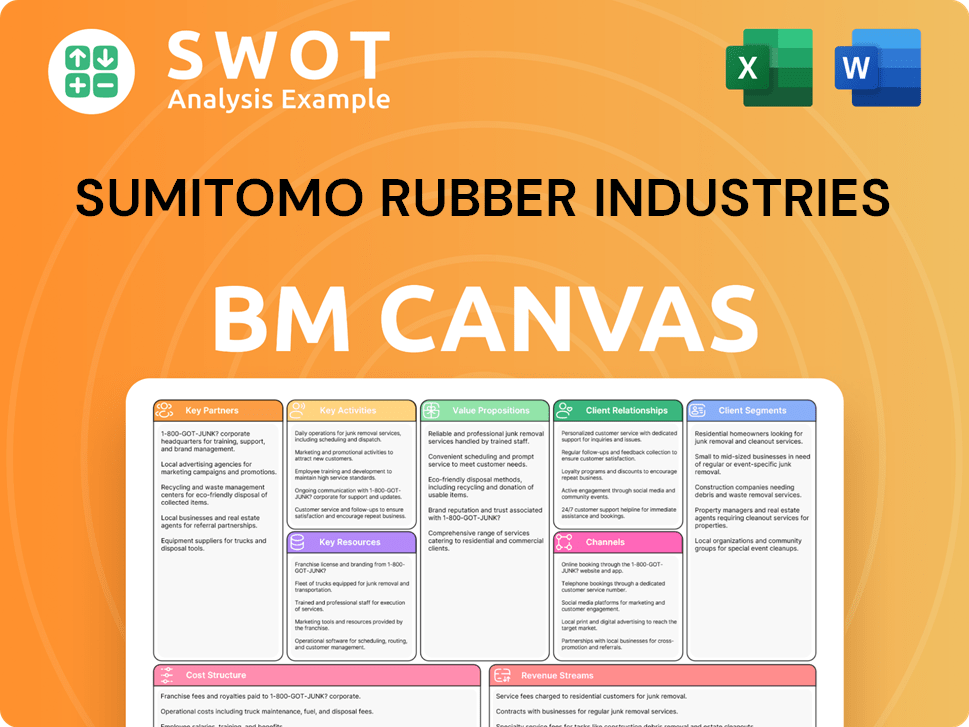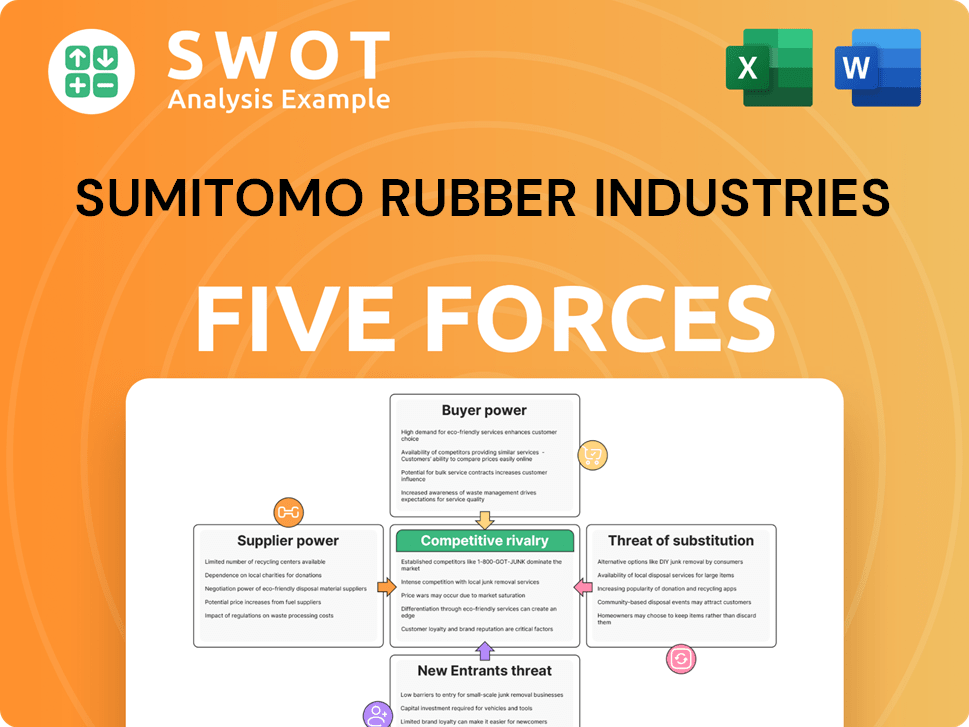Sumitomo Rubber Industries Bundle
Can Sumitomo Rubber Industries Conquer the Tire Market?
Sumitomo Rubber Industries (SRI) is aggressively pursuing its 'R.I.S.E. 2035' strategy, aiming to double its operating profit margin. This ambitious plan is fueled by the strategic acquisition of the Dunlop brand rights in key markets, promising a significant revenue boost. This transformation from a tire manufacturer to a diversified rubber and sports goods conglomerate makes understanding their sales and marketing strategies crucial.

This analysis will dissect Sumitomo Rubber Industries' sales strategy, examining its approach to Sumitomo Rubber Industries SWOT Analysis, distribution channels, and customer engagement. We'll explore the evolution of its marketing strategy, including digital initiatives and brand positioning, and how they plan to navigate the competitive landscape. Understanding SRI's approach is crucial for anyone interested in the Sumitomo tires marketing, business development, and market analysis.
How Does Sumitomo Rubber Industries Reach Its Customers?
The sales strategy of Sumitomo Rubber Industries (SRI) relies on a diverse network of channels to reach its global customer base. This approach includes both established and evolving digital methods. SRI's primary sales channels include wholesale distributors, partner retailers, and direct sales teams. These channels are particularly important for its tire business, which generates the majority of its revenue. Understanding the Revenue Streams & Business Model of Sumitomo Rubber Industries is key to appreciating its sales strategy.
In the automotive sector, SRI supplies original equipment (OE) tires to vehicle manufacturers and serves the replacement tire market. For instance, in the domestic Japanese market, the replacement tire segment saw gains in summer tire volumes in 2024. In North America, sales of the Falken WildPeak tire line and motorcycle tires remained strong in the replacement market despite overall declines in unit sales in 2024. This reflects a focus on the Sumitomo tires marketing within key segments.
SRI's strategic moves, such as acquiring the Dunlop trademark rights, are designed to strengthen its global brand management and sales. This acquisition, finalized on May 7, 2025, allows SRI to directly introduce its Dunlop products in key markets. These strategic shifts are part of SRI business development efforts to enhance its market presence and sales performance.
SRI utilizes wholesale distributors and partner retailers as key sales channels, especially for its tire business. These channels are crucial for reaching a broad customer base and ensuring product availability. This approach supports Sumitomo Rubber Industries market analysis and helps in understanding regional market dynamics.
Direct sales teams are essential for managing relationships with vehicle manufacturers (OE) and key accounts. They focus on providing original equipment tires and supporting the replacement tire market. This direct engagement is a core aspect of the Sumitomo Rubber Industries sales strategy.
SRI serves both the OE market, supplying tires to vehicle manufacturers, and the replacement tire market. The replacement market saw gains in summer tire volumes in Japan in 2024. In North America, the Falken WildPeak tire line and motorcycle tires remained strong in the replacement market despite overall declines in unit sales in 2024. These market segments are crucial for SRI's revenue.
The acquisition of the Dunlop trademark rights in Europe, North America, and Oceania, finalized on May 7, 2025, enables SRI to directly introduce its Dunlop products. This strategic move is expected to contribute to increased sales in North America and Australia in 2025. Goodyear will continue to manufacture, sell, and distribute Dunlop consumer tires in Europe through year-end 2025.
SRI is actively pursuing digital transformation to improve operational efficiency and speed to market. This includes the deployment of Rockwell's FactoryTalk ProductionCentre, a manufacturing execution system (MES) platform, starting at its Shirakawa plant in Japan in the second half of 2025, with plans for global expansion from 2026 onward. This initiative aims to standardize production and integrate business and production data, ultimately improving productivity and quality. This digital focus is a key part of SRI's digital marketing strategy for tires.
- The expansion of the SYNCHRO WEATHER all-season tire lineup from 40 sizes at the end of 2024 to 76 sizes by March 2025, and further to 96 sizes by December 2025, demonstrates a strategic focus on expanding product availability.
- SRI's approach to sales channels includes a strong emphasis on both traditional methods and digital integration.
- The company is investing in technologies like MES to streamline manufacturing processes.
- Strategic acquisitions, such as the Dunlop trademark rights, are important for expanding market reach.
Sumitomo Rubber Industries SWOT Analysis
- Complete SWOT Breakdown
- Fully Customizable
- Editable in Excel & Word
- Professional Formatting
- Investor-Ready Format

What Marketing Tactics Does Sumitomo Rubber Industries Use?
The marketing tactics of Sumitomo Rubber Industries (SRI) are designed to boost brand recognition, generate leads, and boost sales, utilizing a mix of digital and traditional methods. Their approach is strongly data-driven, with a focus on premium products. This strategy is crucial for understanding the Growth Strategy of Sumitomo Rubber Industries and its market positioning.
SRI aims to increase the proportion of premium tires to 60% of total tire sales by 2035, up from the current 40%. This premiumization strategy is supported by the introduction of new products featuring innovative technologies like 'active tread,' which adapts to road conditions. The SYNCHRO WEATHER all-season tire, launched in October 2024, exemplifies this, with its lineup expanding from 40 sizes at the end of 2024 to 76 sizes by March 2025, and a projected 96 sizes by December 2025.
Digital marketing plays a key role in SRI's strategy, with investments in tire sensing technology, 'SENSING CORE,' which began shipping to overseas automotive manufacturers in fiscal year 2024. This technology is expected to expand globally as a solution business in 2025, focusing on data-driven services. Furthermore, in 2024, SRI partnered with Viaduct, an AI-powered vehicle failure prediction solutions provider, to leverage tire data, with full-scale operations in the United States planned for 2025.
SRI uses data to understand customer behavior and market trends, helping them create targeted campaigns and refine product development. This data-driven approach is key to their Sumitomo Rubber Industries marketing strategy.
The company is focused on premium products to increase profitability and brand value. This is supported by the introduction of advanced tire technologies.
SRI is investing in digital technologies, such as tire sensing and AI partnerships, to offer data-driven services and improve customer experiences. This is a key element of their SRI business development.
SRI is focused on strengthening brand management and unifying the Dunlop brand identity. This includes establishing a new branding center to promote company-wide brand investment.
Product launches in the sports business, like SRIXON clubs and balls in 2025, have contributed to increased sales in key markets. This is part of their overall Sumitomo tires marketing strategy.
SRI is expanding its product offerings and geographic reach, particularly in North America and other key regions. This expansion is supported by data-driven insights and strategic partnerships.
SRI's marketing tactics are designed to enhance its Sumitomo Rubber Industries sales strategy and maintain a strong position in the Sumitomo Rubber Industries competitive landscape. These tactics include:
- Data-driven marketing to understand customer needs and market trends.
- Focus on premium products to increase profitability and brand value.
- Digital transformation through tire sensing technology and AI partnerships.
- Strengthening brand management and unifying brand identity.
- Strategic partnerships to expand market reach and service offerings.
- Sports marketing to boost brand visibility and sales.
Sumitomo Rubber Industries PESTLE Analysis
- Covers All 6 PESTLE Categories
- No Research Needed – Save Hours of Work
- Built by Experts, Trusted by Consultants
- Instant Download, Ready to Use
- 100% Editable, Fully Customizable

How Is Sumitomo Rubber Industries Positioned in the Market?
Sumitomo Rubber Industries (SRI) strategically positions itself as a frontrunner in the tire and rubber product sector, emphasizing innovation and sustainability. The company's core message revolves around leveraging its expertise in rubber and analytical technology to drive growth through innovation. This approach is particularly evident in its focus on premium products, aiming to increase their proportion to 60% of total tire sales by 2035.
The acquisition of the global rights to the Dunlop brand, completed in May 2025, is central to this strategy. SRI plans to unify the Dunlop brand identity, making it a core communication brand globally. This brand positioning is designed to resonate with a target audience that values innovation, performance, and sustainability.
SRI's marketing strategy focuses on communicating its technological advancements and commitment to environmental responsibility. This involves highlighting proprietary technologies like 'active tread' and 'SENSING CORE' to create a new value experience for customers. Furthermore, the company's sustainability initiatives, such as the collaboration with Mitsubishi Chemical Corporation to produce carbon black from recycled materials, which is planned for implementation by 2025, reinforce its commitment to a circular economy.
Sumitomo Rubber Industries employs a multi-pronged marketing approach. This includes emphasizing innovation, performance, and sustainability to appeal to its target audience. Key differentiators include its 'active tread' and 'SENSING CORE' technologies.
SRI's business development focuses on expanding its global presence and product offerings. The acquisition of the Dunlop brand rights is a key element of this strategy. The company aims to increase premium tire sales and expand its market share.
Market analysis for Sumitomo Rubber Industries involves understanding consumer preferences and competitive pressures. SRI's focus on premium tires and sustainable practices aligns with evolving market trends. Brief History of Sumitomo Rubber Industries provides more insights.
The brand positioning of Sumitomo Rubber Industries centers on innovation, premium quality, and sustainability. The company aims to provide 'new experiential value' derived from rubber. SRI's long-term strategy, 'R.I.S.E. 2035,' reflects this forward-looking approach.
SRI's key initiatives underscore its commitment to innovation and sustainability. These include technological advancements in tire design and manufacturing processes. The company is also focused on reducing its environmental footprint.
- Focus on premium products, aiming for 60% of total tire sales by 2035.
- Reduction of Scope 1 and 2 greenhouse gas emissions by 55% by 2030 (compared to 2017 levels).
- Aiming for 40% sustainable raw materials in tires by 2030 and 100% by 2050.
- Collaboration with Mitsubishi Chemical Corporation for carbon black production from recycled materials, planned for implementation by 2025.
Sumitomo Rubber Industries Business Model Canvas
- Complete 9-Block Business Model Canvas
- Effortlessly Communicate Your Business Strategy
- Investor-Ready BMC Format
- 100% Editable and Customizable
- Clear and Structured Layout

What Are Sumitomo Rubber Industries’s Most Notable Campaigns?
The sales and marketing strategies of Sumitomo Rubber Industries (SRI) are currently undergoing significant transformations, with key campaigns designed to boost revenue and strengthen its market position. These initiatives focus on premium tire sales, brand unification, technological innovation, and digital transformation. A core element of SRI's strategy involves strategic acquisitions and product expansions, reflecting a commitment to growth and market leadership.
SRI's approach to sales and marketing is multifaceted, incorporating both traditional and digital channels. The company is focused on enhancing its brand presence and expanding its product offerings to meet evolving consumer demands. These strategies are designed to improve its competitive position in the global tire market, with a particular emphasis on North America, Europe, and Oceania. The competitive landscape of Sumitomo Rubber Industries shows that the company is constantly adapting to the challenges and opportunities in the market.
The company's focus on innovation and digital transformation highlights its forward-thinking approach. SRI is leveraging technology to provide value-added services and enhance customer experiences. These efforts are supported by strategic partnerships and investments in research and development, positioning SRI for sustained growth and market differentiation.
SRI's acquisition of the global Dunlop trademark rights for four-wheel consumer vehicle tires in Europe, North America, and Oceania, which closed on May 7, 2025, is a pivotal move. This strategic acquisition is projected to increase annual revenue by at least $500 million. The objective is to unify the Dunlop brand identity and leverage its strong recognition to maximize value, impacting Sumitomo Rubber Industries sales strategy.
The expansion of the 'SYNCHRO WEATHER' all-season tire lineup, equipped with 'ACTIVE TREAD' technology, is another key initiative. Launched in October 2024, the lineup grew from 40 sizes at the end of 2024 to 76 sizes by March 2025, with plans to reach 96 sizes by December 2025. This expansion supports Sumitomo tires marketing efforts by increasing the availability of premium products.
SRI is investing heavily in its 'SENSING CORE' tire sensing technology, which began shipments to overseas automotive manufacturers in fiscal year 2024. A service for predicting automobile breakdowns is set to start in 2025. This represents a shift towards providing value-added solutions beyond just the physical product. This is a key part of SRI's digital marketing strategy for tires.
The partnership with Viaduct in 2024 for AI-powered vehicle failure prediction solutions further supports SRI's digital transformation. Full-scale operations in the US are expected in 2025. This collaboration enhances SRI's ability to offer innovative services, aligning with its broader business development goals.
SRI measures the success of its campaigns through several key performance indicators. Increased sales in Europe, North America, and Oceania are crucial for the Dunlop acquisition. The expansion of the SYNCHRO WEATHER lineup and its sales performance in the domestic market are also important metrics. The company's focus on customer relationship management is also a key factor.
- Increased sales in target regions.
- Improved premium tire ratio.
- Rapid expansion of product size lineups.
- Successful implementation of digital services.
Sumitomo Rubber Industries Porter's Five Forces Analysis
- Covers All 5 Competitive Forces in Detail
- Structured for Consultants, Students, and Founders
- 100% Editable in Microsoft Word & Excel
- Instant Digital Download – Use Immediately
- Compatible with Mac & PC – Fully Unlocked

Related Blogs
- What are Mission Vision & Core Values of Sumitomo Rubber Industries Company?
- What is Competitive Landscape of Sumitomo Rubber Industries Company?
- What is Growth Strategy and Future Prospects of Sumitomo Rubber Industries Company?
- How Does Sumitomo Rubber Industries Company Work?
- What is Brief History of Sumitomo Rubber Industries Company?
- Who Owns Sumitomo Rubber Industries Company?
- What is Customer Demographics and Target Market of Sumitomo Rubber Industries Company?
Disclaimer
All information, articles, and product details provided on this website are for general informational and educational purposes only. We do not claim any ownership over, nor do we intend to infringe upon, any trademarks, copyrights, logos, brand names, or other intellectual property mentioned or depicted on this site. Such intellectual property remains the property of its respective owners, and any references here are made solely for identification or informational purposes, without implying any affiliation, endorsement, or partnership.
We make no representations or warranties, express or implied, regarding the accuracy, completeness, or suitability of any content or products presented. Nothing on this website should be construed as legal, tax, investment, financial, medical, or other professional advice. In addition, no part of this site—including articles or product references—constitutes a solicitation, recommendation, endorsement, advertisement, or offer to buy or sell any securities, franchises, or other financial instruments, particularly in jurisdictions where such activity would be unlawful.
All content is of a general nature and may not address the specific circumstances of any individual or entity. It is not a substitute for professional advice or services. Any actions you take based on the information provided here are strictly at your own risk. You accept full responsibility for any decisions or outcomes arising from your use of this website and agree to release us from any liability in connection with your use of, or reliance upon, the content or products found herein.